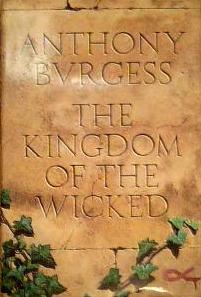 First edition | |
| Author | Anthony Burgess |
|---|---|
| Language | English |
| Genre | Historical novel |
| Publisher | Hutchinson & Co |
Publication date | 1 September 1985 |
| Publication place | United Kingdom |
| Media type | Print (Hardback & Paperback) |
| Pages | 379 pp |
| ISBN | 0-87795-753-3 |
| OCLC | 12051789 |
| 823/.914 19 | |
| LC Class | PR6052.U638 K5 1985 |
The Kingdom of the Wicked is a 1985 historical novel by Anthony Burgess.
Like two of his earlier works, the long narrative poem Moses and the novel Man of Nazareth (together these books make up what has been referred to as his biblical or religious trilogy), Burgess wrote The Kingdom of the Wicked in part as preparation for a screenplay; in this case for the television series A.D.